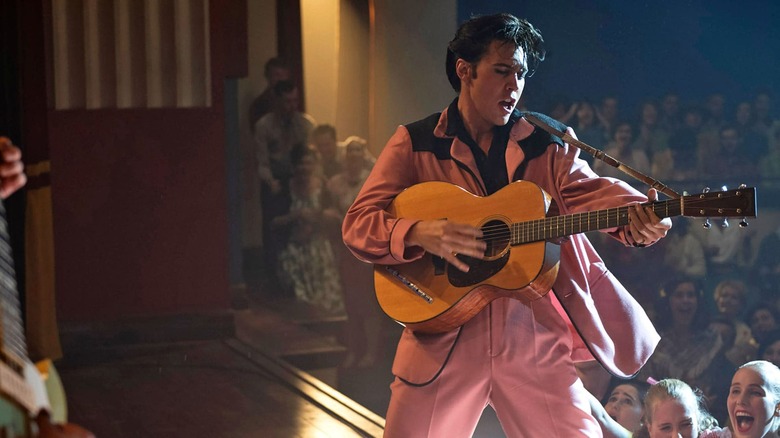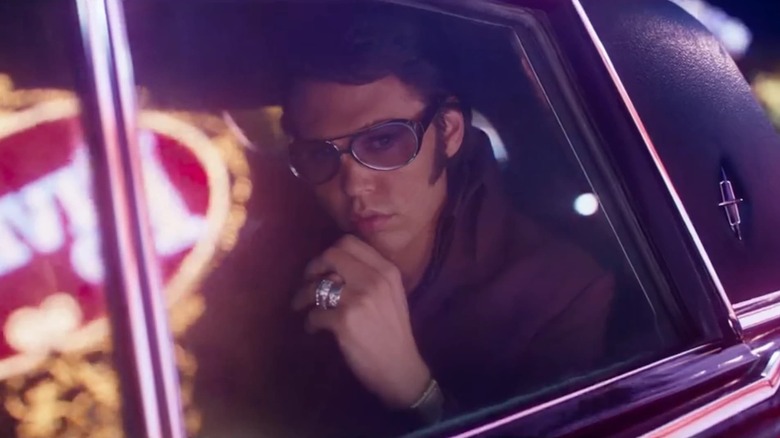Elvis Gave Steven Spielberg Hope For Theatrical Releases
Steven Spielberg is immensely concerned about the future of cinema. The "Fabelmans" director went on record with A.O. Scott of the New York Times to talk about his new movie, but also to express extreme trepidation about where movies stand in the wake of Covid lockdowns. Movies, he feels, aren't drawing crowds to theaters the same way they did in the past, and — perhaps controversially — he felt that people streaming movies at home wasn't a suitable substitute. Back in 2013, in an interview with the Guardian, Spielberg had already predicted a sea change in the future of moviegoing, claiming that expensive, effect-based blockbusters (a class of film he helped pioneer back in the 1970s) would fetch higher ticket prices while smaller, more intimate dramas like his own "Lincoln" would play only smaller arthouses. The director also felt that Netflix and other streaming services should be omitted from Academy Award consideration, feeling the streaming-only work — no matter the quality — should be left in the realm of TV.
Cinemas, he felt, needed a chance to work back to their pre-pandemic numbers. Audiences, Spielberg feels, will eventually come back.
In 2022, the future of cinema is up in the air. In the pages of /Film, three authors pondered the man's comments. Erin Brady feels that Spielberg was right, feeling that the theater experience was invaluable and that audiences will eventually rediscover it. Jeremy Smith, meanwhile, argues that streaming offers a wider and more immediate ease of access to movies. Releasing a film on a streaming service will assure more interesting films will continue to be made. This author, realistically, feels that the argument is more or less moot, as theaters are already past the point of no return.
Elvis will save us
Regardless of /Film's views, Spielberg knows in his heart that audiences will return. In the Times interview, he said that the current model of blockbusters-only was all well and good, and that the expensive, effects bonanzas will surely always draw crowds, as will the frequent low-budget horror hit, a la "Terrifier 2." It was the small crowds found at adult-skewing stories that he found distressing.
Although wild, colorful, and pointedly unrealistic, Baz Luhrmann's 2022 biopic "Elvis" gave Spielberg a reason to believe grown-up movies could thrive. Made on a budget of $80 million, Luhrmann's hyperactive musing on the life of the King earned $282 million internationally and created Oscar buzz for its star Austin Butler. This was an outlier in a year that only saw predictable hits in sequel films like "Top Gun: Maverick" and the Marvel Cinematic Universe. As the director put it:
"There's no question that the big sequels and movies from Marvel and DC and Pixar and some of the animated movies and horror films still have a place in society [...] I found it encouraging that 'Elvis' broke $100 million at the domestic box office. A lot of older people went to see that film, and that gave me hope that people were starting to come back to the movies as the pandemic becomes an endemic. I think movies are going to come back. I really do."
As of this writing, "Elvis" stands (according to Box Office Mojo) as the 11th-highest domestic grosser of the year. Six of the top ten films of 2022 have been superhero movies, and the other four have been sequels to "Top Gun," "Minions," "Jurassic Park," and "Sonic the Hedgehog."
The upswing?
The pandemic sent a shockwave through the world of movies, and studios began to rethink release strategies a lot that year. 2019, the year of "Avengers: Endgame," saw a total domestic box office at around $11.36 billion. That was a slight downward slide from 2017's $11.89b and 2016's $11.38b, but, in a broad sense, depicted a robust film industry that was, at the very least, only on a very slight decline. Then the pandemic hit, theaters closed, and the total domestic theatrical grosses crashed down to $2.1b. Several of the films in 2020's top ten were awards-bait films left over from the previous year, likely all caught hastily in January. "1917" and "Little Women" are among the leaders of the pack.
Despite giant hits like "Spider-Man: No Way Home" and "Venom: Let There Be Carnage," 2021 did not see an enormous rebound, with everything outside of expected blockbuster floundering. The total grosses for 2021 were only $4.48b in toto. Not nearly "back to normal," but a slight regrowth.
2022 saw the upward trend continue, with receipts already totaling $6.7b, and a #1 film that earned over $700 million on its own. This article, it should be noted, is being written prior to the release of "Avatar: The Way of Water," which could very well be a billion-dollar hit unto itself. Should the trend continue, and audiences continue to see movies in theaters in a continuing upward trajectory, perhaps Spielberg will be proven right. It still seems as if the theatrical marketplace has changed too much to get back to the glory days of 2018 and 2019, but there is a definite growth trend at work.
It now falls to us to get to theaters to watch more adult dramas.


